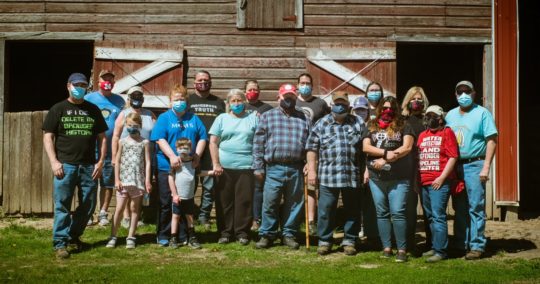Nebraskans are talking…
Talking about the second pipeline that TransCanada wants to build right through the Sandhills and the Ogallala Aquifer.
Talking about how no one has the basic answer to “Do we have an Emergency Response Plan that handles the current TransCanada pipeline that is already in the ground and recently started to be filled with tar sands oil and chemicals?”
Talking about how our state will need to build 3 new transmission lines to support the proposed pipeline and upgrades to 2 other transmission lines.
Talking about how the cost of the new transmission lines is estimated between $49-64 million, which Nebraskans will pay for upfront and TransCanada is going to pay the state back every month on a payment plan (and the majority of jobs won’t go to Nebraskans, and the lines can’t be used for wind since the pipeline will consume the energy needs).
Talking about how maybe we should require TransCanada to put money into a trust NOW for families, landowners and the state so when a spill or other safety mishap occurs the state and taxpayers are not left holding the bag.
Talking about how completely wrong it is for our state to allow a multi-national company to cut through our land and water to pump their oil to a refinery only to sell that oil on the marketplace—meaning, we are risking our land, water and economic activity, and the oil is not coming back to the United States. It’s not helping get us off foreign oil.
NPPD held a series of meetings to educate landowners and concerned citizens about the building of the new transmission lines to support the proposed pipeline. NPPD has been transparent and answered all questions that individuals asked at the hearings. We understand NPPD is doing their job and preparing for a customer’s, in this case TransCanada’s, need for energy. We will continue to ask questions and are confident NPPD will continue to provide answers.
We trust NPPD. We don’t trust oil companies.
Oil companies tell us they have the best technology and can detect pipeline leaks right away.
Oil companies tell us they can contain spills almost immediately.
Oil companies tell us they will be 100% responsible for any leaks in their pipes and clean-up will start right away.
Oil companies tell us the chance of a leak is once every 7,400 years per mile of pipeline.
Well, call me silly but I don’t believe oil companies. What is happening in Michigan, Utah and South Dakota are the latest reasons why I don’t believe oil companies.
The National Wildlife Federation issued a new report with pages of reasons why we should not believe oil companies claims of safety. The report documents hundreds of deaths, spills, fires and damage to wildlife.
And, on July 28th, Senator Nelson issued his second statement on the TransCanada pipeline. We like where Nelson is going in his statement, he is asking for more accountability and for more questions to be asked. He also mentions the spill in Michigan:
“Certainly with the continuing Gulf of Mexico oil spill tragedy and a break in a pipeline this week in Michigan, the State Department should seek to gain a better understanding of safety issues and the environmental impacts of the proposed oil pipeline on our state. It is important that the Department seek all analyses regarding the Keystone project, not only from federal sources but also from state and local government agencies.”
These actions by the NWF and Senator Nelson are just recent activity. Members of Congress, State Senators, federal agencies and citizens are all talking about their concerns and have the data to back those concerns up.
Secretary Clinton has not issued the permit TransCanada needs in order to build the second pipeline. And yet, that has not stopped TransCanada from entering into contract with NPPD and beginning negotiations with landowners.
Some will see this as TransCanada simply preparing so that if/when they get the permit then they are ready to roll.
We think it’s arrogant. We also think TransCanada is underestimating the concern Nebraskans have about the proposed pipeline and the safety of the current pipeline already in the ground.
Action:
Help stop the pipeline. Sign our petition and pass on info about the pipeline to your friends.



